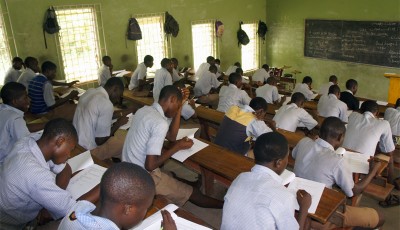Warning: Undefined array key "dirname" in /home/anapuafm/public_html/wp-content/themes/anapuafm/include/plugin/filosofo-image/filosofo-custom-image-sizes.php on line 133
Warning: Undefined array key "extension" in /home/anapuafm/public_html/wp-content/themes/anapuafm/include/plugin/filosofo-image/filosofo-custom-image-sizes.php on line 134
WAEC bans cellular devices
In an effort to help curb examination malpractice in the country, the West African Examinations Council (WAEC) has instituted some measures to nip the canker in the bud.
The measures include banning the use of cellular devices at examination centres with immediate effect.
Consequently, invigilators, supervisors and candidates will not be allowed to use mobile phones and other such gadgets during examinations.
According to WAEC, the ban had become necessary after the results of a research which established that adults were primary culprits in examination malpractice at all levels of education in the country.
In addition, it said, no supervisor or invigilator would be allowed, under any circumstance, to supervise or invigilate candidates from schools to which the supervisor or invigilator was affiliated.
The Head of the Ghana National Office of WAEC, Mrs Wendy E. Addy-Lamptey, said ordinarily, a candidate would not go out of his or her way to look out for ‘Ap?’ or external help to pass well in an examination, be it the Basic Education Certificate Examination (BECE) or the West African Senior School Certificate Examination (WASSCE).
“It is adults who are pushing these little ones to fall into the trap of examination malpractice,” she stated.
She further expressed concern over the fact that there was too much interference by adults in examinations which, she noted, was affecting the performance of candidates.
Rogue website operators
Mrs Addy-Lamptey also asked candidates and the public to be wary of the activities of rogue website operators who claimed to have access to examination questions but ended up swindling their victims.
She advised the public to desist from dealing with such people whose activities should rather be reported to WAEC or the nearest police station.
She gave an assurance that the question papers for the upcoming BECE were secure.
BECE
The ban on the use of cellular devices at examination centres comes a few days to the start of the 2019 BECE.
In all, more than half a million candidates from 16,871 schools will write the examination at 1,880 centres throughout the country from Monday, June 10, 2019.
Out of the 517,332 candidates who will write the examination, 263,616 are males, while 153,716 are females.
Regional breakdown
Giving a regional breakdown of the candidates, Mrs Addy-Lamptey said the Ashanti Region had 104,461, representing the highest number, followed by the Greater Accra Region with 90,584, while the Central Region will present 55,535.
The Western Region has 52,806 candidates, while the erstwhile Brong Ahafo, Eastern and Northern regions will present 49,127, 47,964 and 43,960 candidates, respectively.
The Upper West Region has the least number of 13,109 candidates, followed by Upper East with 22,001, while the Volta Region has 37,785 candidates.
In all, 1,880 supervisors will be deployed throughout the country, to be supported by 1,710 assistant supervisors and 18,136 invigilators.
Guidelines
Mrs Addy-Lamptey said WAEC had also issued stern directives to safeguard the integrity of the BECE.
Under the guidelines, she said, candidates would be thoroughly searched when entering or exiting the examination room.
“Candidates should be seated 30 minutes prior to the start of a paper,” she said, adding that any candidate who reported late for the paper would not be allowed access to the room.
“For the avoidance of doubt, a candidate is deemed to be late when he or she reports after the supervisor has given the order to start work,” she explained, adding: “All papers must start and end as the final timetable stipulates. In the event that a paper starts late, the supervisor would have to explain, in writing, the reason(s) for the delay.”
Ghana Education Service
In a related development, the Ghana Education Service (GES) has reminded all BECE supervisors, invigilators and candidates that the basis of success in life is honesty and hard work.
It has, therefore, urged all candidates and stakeholders to eschew all forms of examination malpractice during the period of the examination, adding that all cases of reported examination malpractice will swiftly be investigated and dealt with decisively.
A statement signed and issued by the Head of the Public Relations Unit of the GES, Ms Cassandra Twum Ampofo, advised candidates to “note the rules governing the conduct of the examination and abide by them in order to ensure an incident-free examination”.
It also warned unauthorised persons to stay away from examination centres.
“We also encourage the security agencies to help deal decisively with all those who attempt to undermine the integrity of the exercise to jeopardise the future of the candidates.
“The management of the GES wishes to congratulate all candidates on their hard work and fortitude so far,” it added.
It assured all candidates and stakeholders that management had worked closely with the WAEC to ensure the smooth conduct of the examination throughout the country.
Source Graphic



